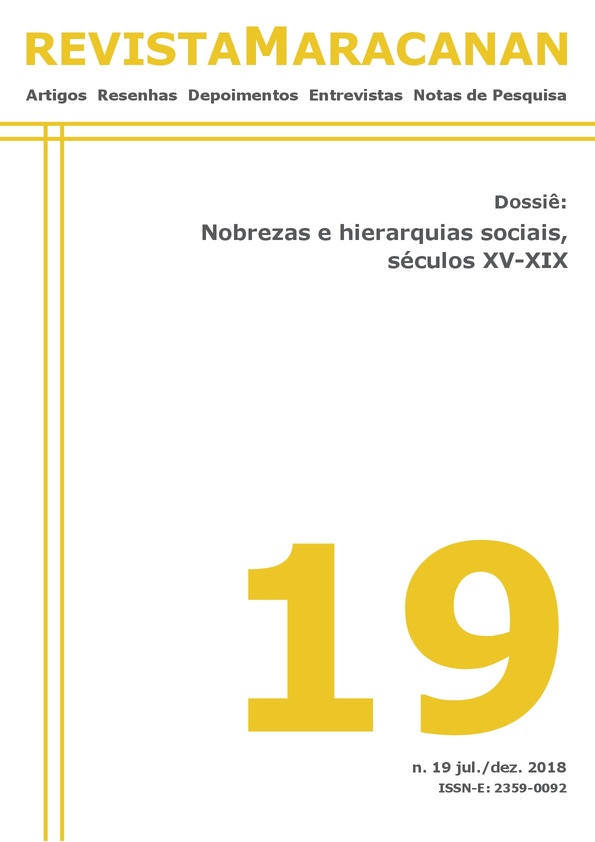Nobres e magistrados: uma discussão sobre o conceito de nobreza
DOI:
https://doi.org/10.12957/revmar.2018.33645Palabras clave:
Nobreza, Magistrado, OficiosResumen
Neste trabalho, discutiremos a importância do conceito de nobreza para um grupo em particular: os magistrados. Diferente dos demais oficiais régios, devido à formação em Direito, eles se destacavam por exercerem e interpretarem as Leis, bem como por representarem a face mais visível dos Monarcas: a Justiça. Os magistrados formavam um grupo mais alargado e heterogêneo em suas obrigações e interesses pessoais: os letrados, que influenciaram todo o período moderno português. Ao longo do tempo, surgiu a indispensabilidade de situarmos o conceito de nobreza e suas subdivisões para construirmos o perfil, as carreiras, as hierarquias e as estratégias/estratagemas destes indivíduos e dos demais grupos constituintes da administração portuguesa e de suas conquistas.
Citas
CAETANO, Antônio Filipe Pereira. Comunicações jurídicas, circulações judiciais e redes governativas na Comarca das Alagoas (1789-1821). In: Dinâmicas sociais, políticas e judiciais na América Lusa: hierarquias, poderes e governo (século XVI-XIX). Recife: Ed. UFPE, 2016.
CAMARINHAS, Nuno. Juízes e administração da justiça no Antigo Regime: Portugal e o Império colonial, séculos XVII e XVIII. Lisboa: Fundação Calouste Gulbenkian, 2010.
CHARTER, Roger. O Homem de Letras. In: VOVELLE, Michel (dir.). O homem do Iluminismo. Lisboa: Presença, 1997.
FRAGOSO, João; MONTEIRO, Nuno Gonçalo (orgs.). Um Reino e suas Republicas: comunicações políticas entre Portugal, Brasil e Angola nos séculos XVII e XVIII. Rio de Janeiro: Civilização Brasileira, 2017.
GINZBURG, Carlo. A Micro-História e outros ensaios. Rio de Janeiro: Bertrand,1991.
HESPANHA, António Manuel; SANTOS, Maria Catarina. Os poderes num Império Oceânico. In: (coord.). História de Portugal. Vol. 4: O Antigo Regime, 1620-1807. Coord.: Antônio Manuel Hespanha. Lisboa: Estampa, 1998.
LEVI, Giovanni. Prefácio. In: OLIVEIRA, Mônica Ribeiro de; ALMEIDA, Carla Maria de Carvalho (orgs.). Exercícios de micro-história. Rio de Janeiro: FGV, 2009.
LEVI, Giovanni. Usos da biografia. In: FERREIRA, Marieta de Moraes; AMADO, Janaína (orgs.). Usos e abusos da história oral. Rio de Janeiro: FGV, 2006.
MARAVALL, José Antônio. Poder, honor y élites em el siglo XVII. Madrid: Siglo XXI, 1989.
MELLO, Isabele de Matos Pereira de. Magistrados a serviço do Rei: a administração da Justiça e os Ouvidores Gerais na Comarca do Rio de Janeiro (1710-1790). Rio de Janeiro: Arquivo Nacional, 2015.
MONTEIRO, Nuno. O “Ethos” Nobiliárquico no final do Antigo Regime: poder simbólico, império e imaginário social. Almanack Brasiliense, São Paulo, n. 2, p. 4-20, 2005.
NAPPI, Thiago Rodrigues. Dos sentimentos de honra na literatura política do Antigo Regime segundo as concepções de Montesquieu. 2014. Dissertação (Mestrado em História) - Centro de Ciências Humanas, Letras e Artes, Programa de Pós-Graduação em História, Universidade Estadual de Maringá, Maringá – PR.
OLIVAL, Fernanda. Mercado de hábitos e serviços em Portugal (séculos XVII-XVIII). Análise Social, v. XXXVIII, n. 168, p. 743-769, 2003.
RAMINELLI, Ronald. Viagens Ultramarinas: monarcas, vassalos e governo a distância. São Paulo: Alameda, 2008.
RONALD, Raminelli. Nobreza sem linhagem. In: Nobrezas do novo mundo: Brasil e ultramar hispânico, séculos XVII e XVIII. Rio de Janeiro: Ed. FGV, 2015.
SCHWARTZ, Stuart. Burocracia e sociedade no Brasil colonial: o Tribunal Superior da Bahia e seus desembargadores, 1609-1751. São Paulo: Perspectiva, 1979.
SILVA, Maria Beatriz Nizza da. Ser nobre na colônia. São Paulo: Ed. UNESP, 2005.
SUBTIL, José. Os desembargadores em Portugal (1640-1820). In: CUNHA, Mafalda Soares da; MONTEIRO, Nuno Gonçalo; CARDIM, Pedro (orgs.). Optima Pars: elites Ibero-Americanas do Antigo Regime. Lisboa: ICD, Imprensa de Ciências Sociais, 2005.
Descargas
Publicado
Cómo citar
Número
Sección
Licencia
Os autores mantêm os direitos autorais e concedem à Revista Maracanan o direito de publicação, sob uma Licença Creative Commons Atribuição 4.0 Internacional, a qual permite que outros distribuam, remixem, adaptem e criem a partir do seu trabalho, mesmo para fins comerciais, desde que lhe atribuam o devido crédito pela criação original.
Os dados e conceitos abordados são da exclusiva responsabilidade do autor.
A Revista Maracanan está licenciada com uma Licença Creative Commons Atribuição 4.0 Internacional.





